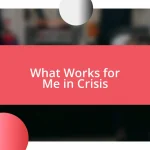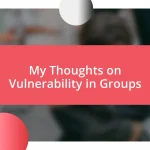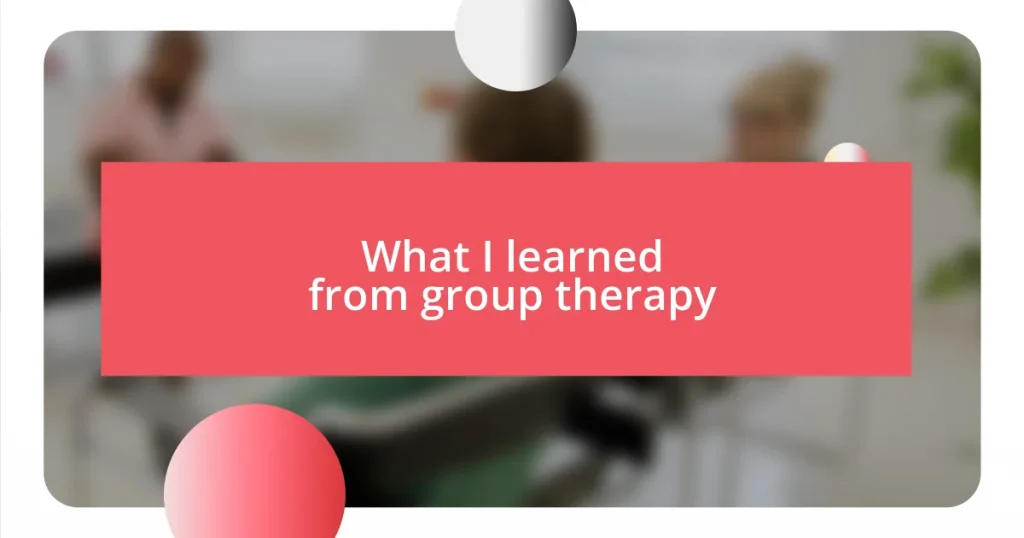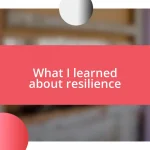Key takeaways:
- Group therapy fosters a sense of belonging and connection through shared experiences, promoting personal growth and healing.
- Trust and support networks develop over time, enhancing the feeling of community and extending beyond therapy sessions.
- Effective communication skills, including active listening and expressing feelings constructively, empower individuals to navigate conflicts and improve relationships.
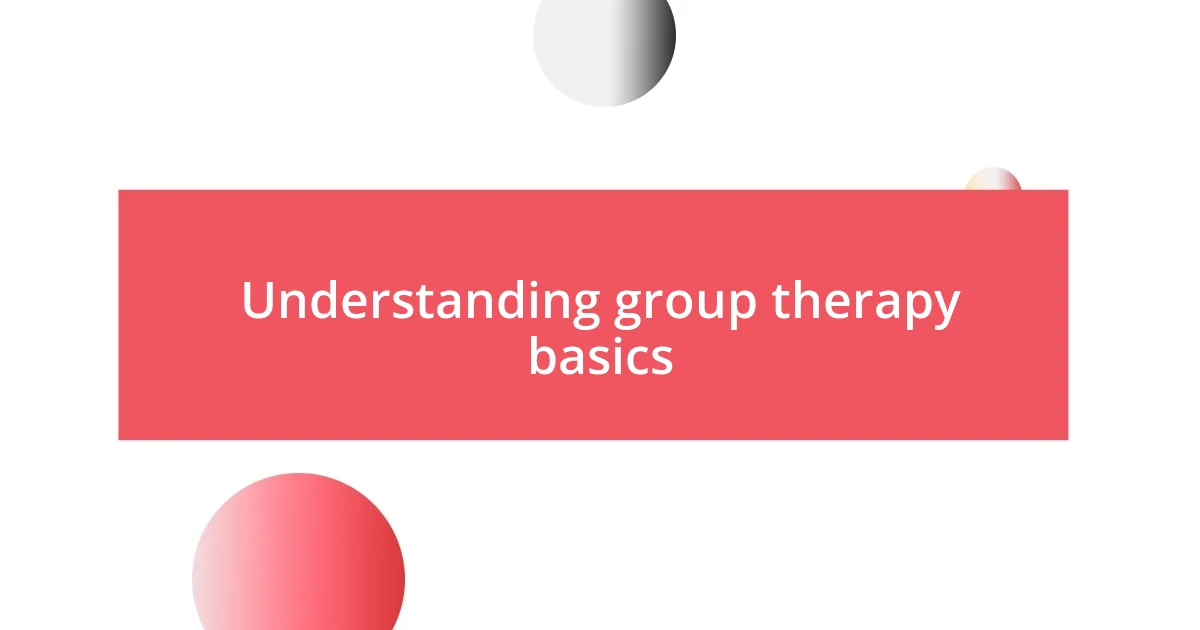
Understanding group therapy basics
Group therapy is a unique experience that combines the power of shared feelings and collective healing. I remember sitting in my first session, surrounded by strangers who felt eerily similar to me. How could it be that in a room full of people, I felt more understood than ever? This immediate connection is one of the fundamental strengths of group therapy; it fosters a sense of belonging that can be hard to find elsewhere.
At its core, group therapy allows individuals to express personal experiences in a supportive environment. I once shared a deeply personal story about my struggles with anxiety, and to my surprise, others were eager to share their own. This reciprocity brought a wave of relief. It was a reminder that while our journeys may differ, our feelings and challenges often intersect. Isn’t it powerful to realize we’re not alone in our battles?
One crucial aspect of group therapy is the role of a trained facilitator who guides the discussions and ensures a safe atmosphere for sharing. I watched my therapist skillfully navigate the group dynamics, encouraging members to speak while maintaining respect and empathy for each other. This delicate balance is what transforms a group into a healing community. Don’t you think having someone hold that space makes sharing your truth a bit easier?
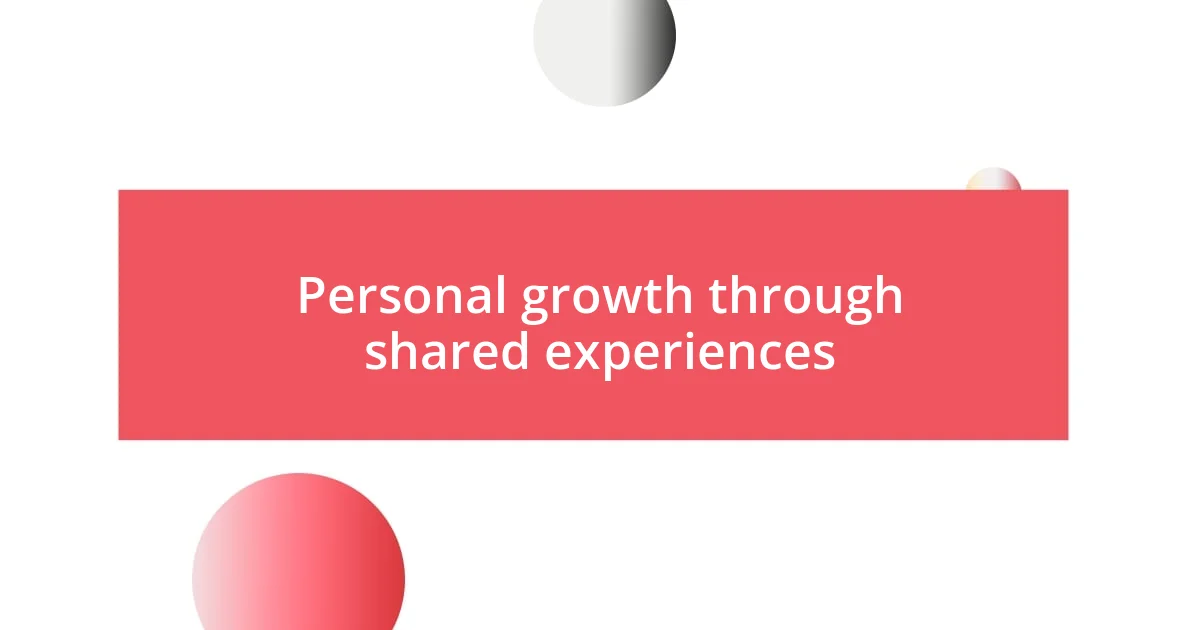
Personal growth through shared experiences
Sharing experiences in group therapy has been a profound catalyst for my personal growth. I remember a particular session where I hesitated to share something vulnerable, but as others opened up, I felt an invisible nudge to do the same. The collective vulnerability created a powerful atmosphere, and it struck me that my fears were shared by many, fostering an unexpected sense of courage within me.
- Realization of common struggles
- Enhanced empathy toward others’ experiences
- Access to diverse perspectives on personal challenges
- Motivation to confront my own issues through others’ stories
- Feelings of validation and acceptance in the safe environment
Every time I share with the group, I realize how valuable these shared experiences are. It’s not just about finding solutions but also about witnessing the healing power of connection. I’ve faced moments of doubt, and hearing others’ journeys has profoundly reshaped my outlook. I’ve often caught myself smiling as someone recounts a story that resonated deeply; it’s as if we’re all walking a similar path, each step lighting the way for the others. Such moments are reminders that growth often happens in community, transforming isolation into connection.
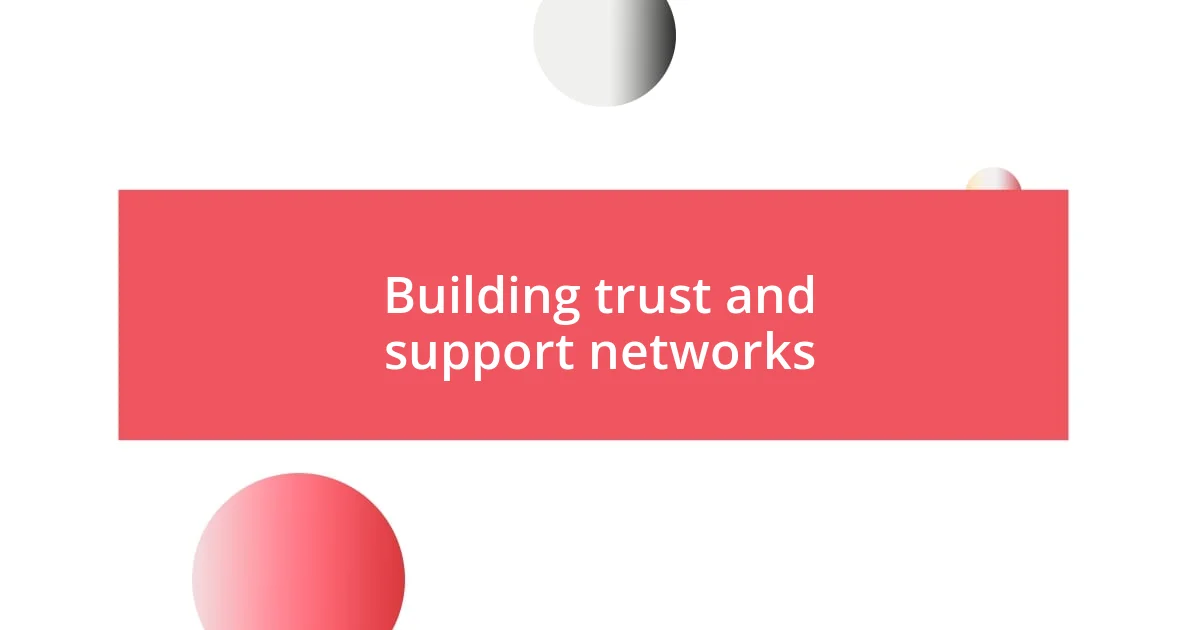
Building trust and support networks
Building trust and support in group therapy is an enlightening journey. I vividly recall the moment when I first felt the group’s trust envelop me. It happened while discussing a particularly tough week; as I shared my struggles, I noticed several nods of understanding and compassion. In that moment, I felt a connection that surpassed mere words—our shared vulnerabilities created an unspoken pact of support. Doesn’t it feel freeing when you realize you are safely held by those who understand?
Trust in a group doesn’t blossom overnight. It often develops through consistent sharing and active listening. One session solidified this for me when a quiet member opened up about their deepest fears. When I saw how the group rallied around them with encouragement, it taught me the importance of being a pillar of support. I found myself becoming more open and engaged with others. Have you ever noticed how a single act of vulnerability can inspire reciprocation?
The beauty of building these networks is that they often extend beyond therapy sessions. I remember exchanging contact information with a fellow member, and soon we were texting support throughout the week. This connection felt like a sturdy bridge, allowing us to lean on each other outside the therapy room. The growth of these bonds reinforces the idea that we’re not just a group—we’re a community, woven together through shared experiences and support. Wouldn’t you agree that having reliable connections makes the healing process less daunting?
| Aspect | Group Therapy |
|---|---|
| Trust building | Develops through sharing and mutual vulnerability |
| Support networks | Extend beyond sessions, creating lasting connections |
| Encouragement | Mutual validation and empathy foster growth |

Learning effective communication skills
Learning effective communication skills in group therapy has been transformative for me. Early on, I discovered that active listening was just as important as speaking. I vividly remember sitting in a circle, and how genuinely hearing someone else’s story shifted my perspective. Instead of planning my response while they talked, I learned to focus on their feelings. Have you ever noticed how simply listening can build bridges of understanding?
During one session, a member shared their struggles with anxiety, and I felt an instinctive urge to comfort them. Rather than jumping in with unsolicited advice, I practiced reflecting back their feelings, which created a deep sense of connection. It was eye-opening to see how a few empathetic words can foster trust. I realized that effective communication isn’t just about expressing myself; it’s about creating a space where others feel safe to share their truths.
As the weeks went by, I found myself articulating my feelings with greater clarity. In one instance, I expressed frustration over a recurring issue that had been weighing on me. The response wasn’t just understanding but also encouragement from others, which bolstered my confidence. I began to appreciate that communication is a two-way street—by sharing bravely, I not only freed myself but also opened the floodgates for others to be transparent. Isn’t it amazing how vulnerability can catalyze more authentic conversations?
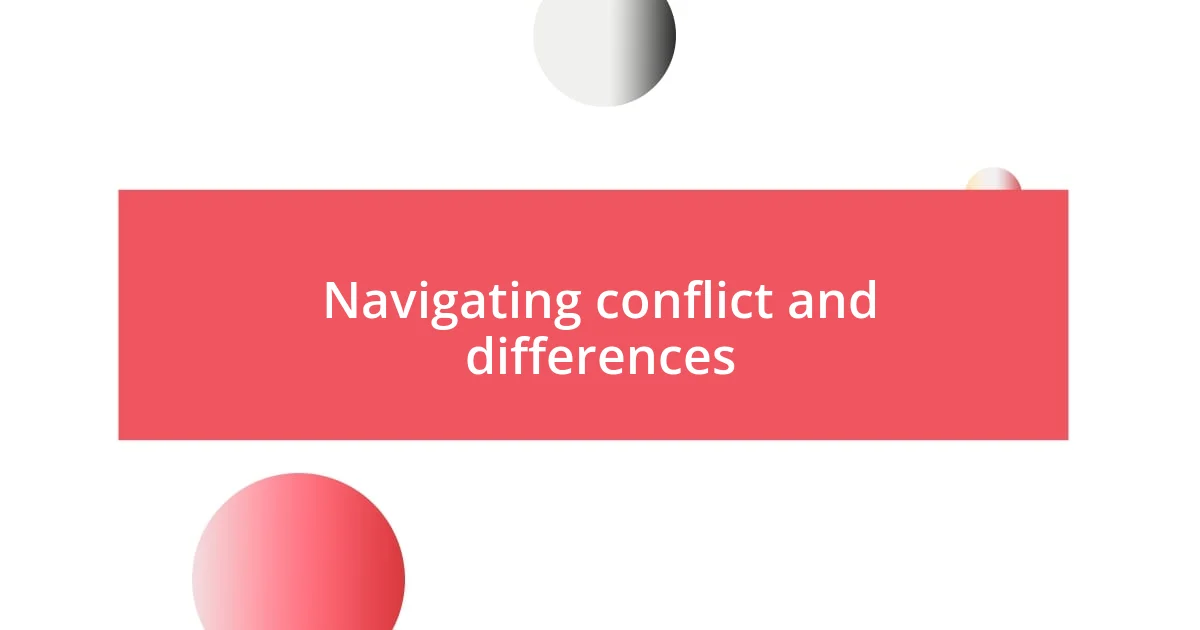
Navigating conflict and differences
Navigating conflict within group therapy can feel like walking a tightrope. I remember a session where opposing opinions surfaced during a discussion about coping strategies. Initially, there was tension in the air, but I soon realized that addressing those differences head-on ultimately enriched our conversation. Have you noticed how embracing differing viewpoints can lead to deeper understanding?
One particular incident stands out in my mind. I witnessed two members passionately disagreeing about a method that worked for them. Instead of retreating into uncomfortable silence, they both took a step back to explain their perspectives. That moment taught me that conflict isn’t necessarily destructive; it can be an opportunity for growth and learning. Isn’t it fascinating how what seems like a hurdle can actually become a stepping stone toward clarity?
In my experience, acknowledging and respecting differences paves the way for constructive dialogue. I vividly recall the moment I learned to rephrase my thoughts during a heated discussion. By focusing on “I feel” statements instead of accusatory language, I found it easier to express my views without escalating tensions. This shift not only alleviated my anxiety about conflict but also encouraged others to do the same. Haven’t you found that when we speak from our hearts, others are more willing to listen?
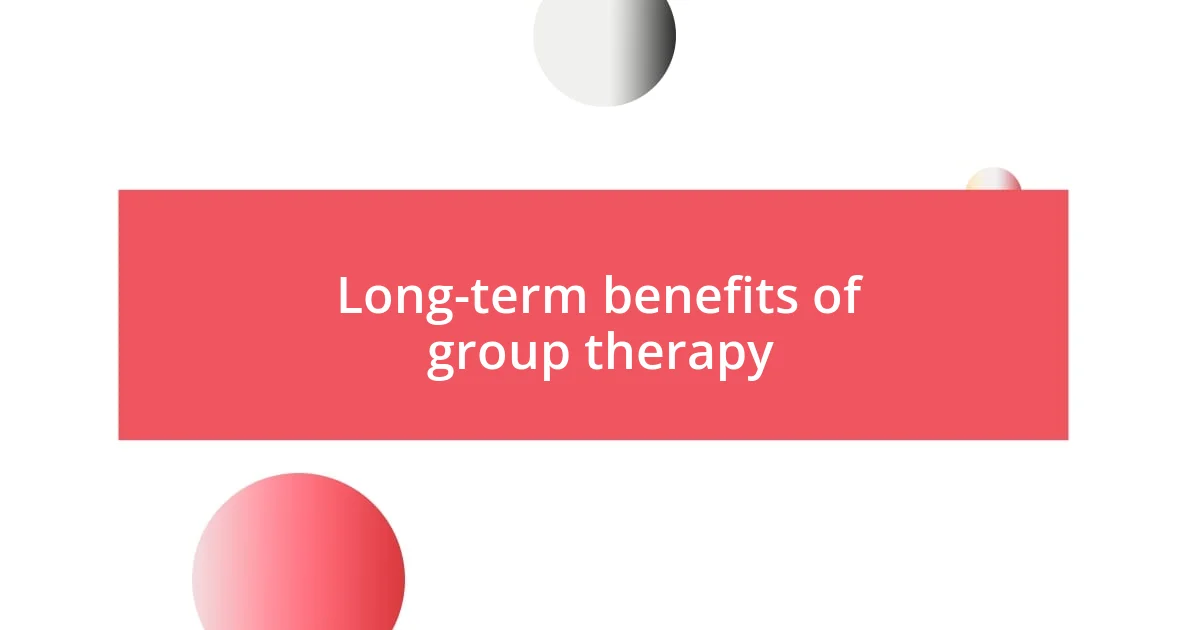
Long-term benefits of group therapy
Understanding the long-term benefits of group therapy has reshaped my approach to relationships. One striking realization was how my sense of belonging significantly improved over time. I remember a moment when a member confided in us about a personal challenge, and as I listened, I felt an overwhelming sense of connection. It dawned on me that the group became a safety net, allowing me to share my vulnerabilities without judgment. Have you ever felt that strange warmth when you know others genuinely understand your struggles?
Another long-term gain was the development of resilience. In one memorable session, I shared a setback I faced, expecting sympathy. Instead, I received constructive feedback from my peers. Initially, it felt uncomfortable, but over the following weeks, I noticed how much their honest perspectives helped me grow stronger. By embracing this kind of feedback, I learned to pivot and adapt rather than dwell on failures. Isn’t it empowering to realize that setbacks can be fertile ground for new insights?
Moreover, the skills fostered in group therapy extend far beyond the sessions themselves. I often reflect on the strategies we discussed and find myself applying them in everyday situations. Whether it’s navigating a tricky conversation at work or addressing a misunderstanding with a loved one, the ability to approach these moments with empathy and clarity has been a game changer. How liberating is it to feel equipped for life’s challenges because of what I learned alongside my group?
